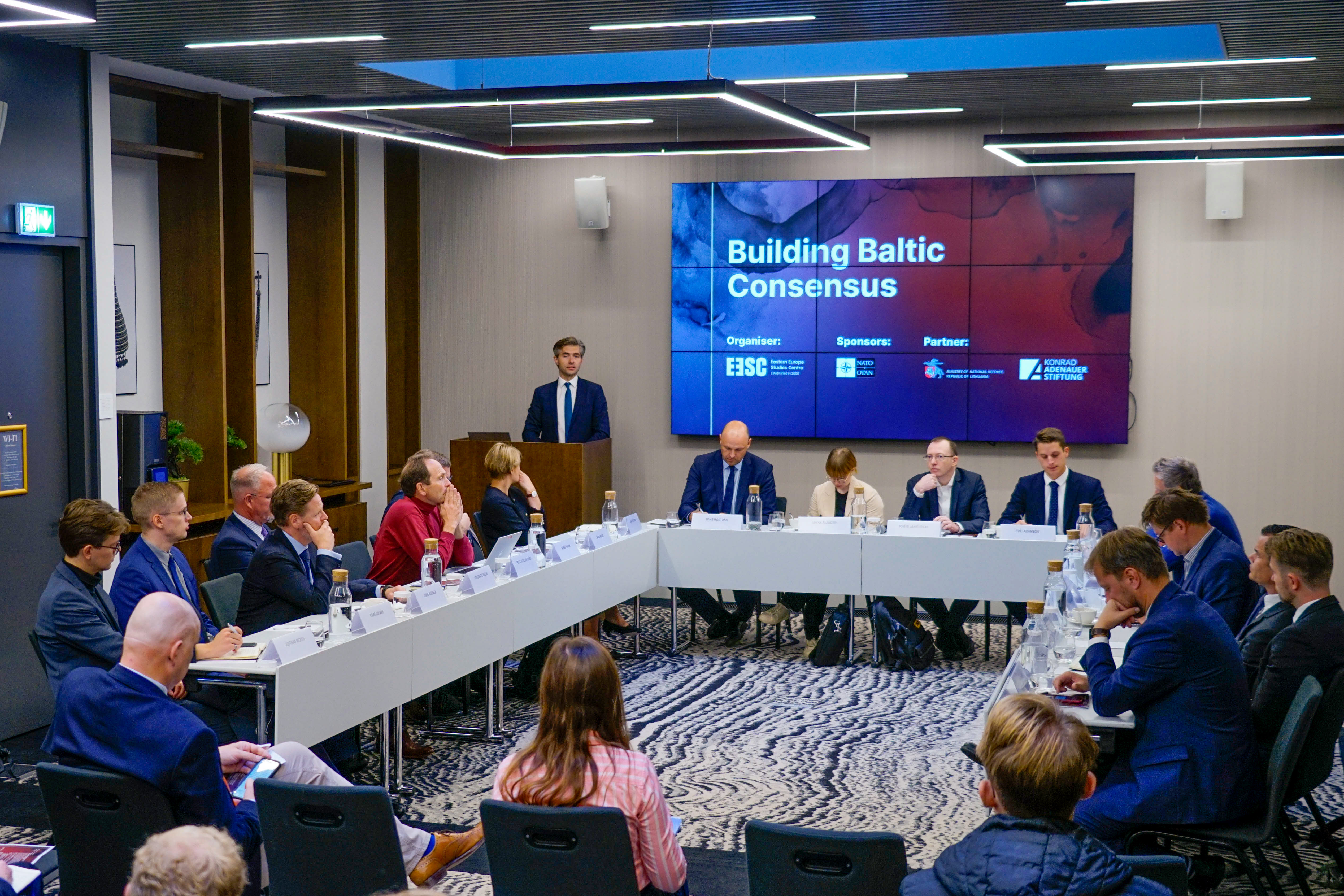The seventh annual “Chief of Diplomacy” Stasys Lozoraitis Lithuanian Foreign Policy Conference was held at the Palace of the Grand Dukes of Lithuania on December 10, organised by the Eastern Europe Studies Centre with the assistance of the Konrad Adenauer Foundation. The conference’s topic was Lithuanian foreign policy in a turbulent world, with it aiming to discuss the most pertinent challenges that Lithuania currently faces in its foreign policy. The conference was comprised of three panels exploring respectively Lithuanian energy security, Belarus and China.
The conference opened with welcoming statements by the EESC’s director Linas Kojala and Konrad Adenauer Foundation director for the Baltic States Elisabeth Bauer.
Lithuanian Minister of Energy Dainius Kreivys made a presentation for the first panel. In it, the minister sought to examine the energy security situation from a broader perspective than solely Lithuania’s and instead at the level of the entire European Union. The minister noted that energy security is an inseparable part of national security, which is why ensuring energy security is a core precondition for the harmonious functioning and defence of any state. According to Mr Kreivys, the vast price increases due to post-pandemic recovery and Russian market manipulations served as an exceptionally clear indicator of all the flaws in Europe’s energy security and their potential costs. In this context, the minister stated that Germany’s ambitious aim of abandoning nuclear energy and solid fuels entirely over the coming decade, shifting fully to generating electricity through renewable sources and natural gas, will inevitably lead to a growth in natural gas demand. When the Nord Stream 2 pipeline becomes functional, gas volumes exported from Russia to Germany will increase to a markedly higher level than seen today. According to the minister, there exists an unofficially expressed argument in Berlin as to why Russia is relied on in implementing the Nord Stream 2 project – that after the pipeline is launched, it will not be Germany who is dependent on Russia but Russia on Germany. However, Russia has diversified its gas export directions for dozens of years, as well as controlling the three largest German gas repositories, which are essentially being kept vacant during a time of peaking prices. Furthermore, the cases of Ukraine and Moldova clearly showcase how Russian energy instruments can be exploited for political pressure.
In the Lithuanian context, Astravyets Nuclear Power Plant serves as one such tool of pressure, though recently implemented decisions on emergency synchronisation with the Polish energy grid and barring electricity from Astravyets from entering Lithuania’s energy systems have reduced this nuclear power plant’s geopolitical influence. It is precisely due to these threats, according to Minister Kreivys, that the European Union must understand the energy sector as a factor of national security. The minister concluded his presentation with a call for dedicating more intellectual capacities to the analysis and understanding of major energy issues, as well as working with Western partners across all diplomatic channels, coordinating actions to ensure energy security.
The second panel on the challenges posed by the Belarusian regime was held as a discussion featuring the chairman of the Seimas of the Republic of Lithuania Committee on National Security and Defence (NSGK) Laurynas Kasčiūnas and the chairman of the Committee on Human Rights (ŽTK) Tomas Vytautas Raskevičius, with the talks being moderated by the EESC’s chief project officer Simona Merkinaitė.
Mr Raskevičius observed that Belarus’ actions challenge Lithuania across three dimensions – national security, foreign policy and human rights. He also pointed out that the migration crisis agenda imposed on Lithuania has completely eliminated from Lithuanian discourse discussions on the suppression of the Belarusian people’s rights by the regime and made the topic of national security predominant. Mr Kasčiūnas responded that he disagrees with the idea that Aliaksandr Lukashenko was able to impose his own agenda on Lithuania. According to the NSGK chairman, Lithuania did not yield to Lukashenko’s initial rhetoric regarding cooperation after the political crisis of 2020, which forced the Minsk regime to seek other means of influence, with the escalation of illegal migration becoming one of them. However, here too, the decisions of Lithuania and Poland in regard to turning migrants back have countered him, making the Lukashenko regime unable to suitably exploit this crisis for either negotiations with Lithuania or the EU. The NSGK chairman also stated that he does not view the push-back policies as violating human rights because it is namely support for illegal migration that would be an incentive for potential migrants to continue falling prey to human traffickers. According to Mr Kasčiūnas, Lukashenko is only able to persist thanks to the loyalty of his armed forces and internal power structures, as well as Russian support. However, he is no longer in any social contract with society and, in one way or another, the cycle of repressions must transition to a new stage.
Both speakers agreed that the most important matter is to remain cautious and be proactive because the migrant crisis has once more proven that the boundaries between war and peace are vanishing in the contemporary world. At first glance, social crises can develop military elements and, in such situations, political solutions are needed to identify the threat. Mr Kasčiūnas noted that Lithuania is fairly capable in this respect, with him mentioning the country’s work when it comes to the security of investment into strategic objects. However, this problem remains pertinent across other EU and EEA countries and it would be in Lithuania’s interest to promote these questions in the international agenda.
The discussion was rounded out by a comment from the Eastern Europe Studies Centre board member and VU TSPMI lecturer Vytis Jurkonis, who noted that the contrasting of national security and human rights, forming an artificial choice between the two, is mistaken, as well as that it should not be Lithuania’s aim to depose the dictator instead of the Belarusians themselves, but instead for international legal norms to apply in Belarus and for real elections to be held there because this is what Belarusian society wants and it
The third panel on relations with China was moderated by the Eastern Europe Studies Centre’s senior policy analyst Vladimiras Laučius, hosting two members of parliament – Gintautas Paluckas of the Lithuanian Social Democratic Party and Matas Maldeikis of the Homeland Union – Lithuanian Christian Democrats.
Mr Paluckas stated that Lithuania’s current foreign policy is notable for not pursuing consensus in parliament. He also noted that Lithuania pushed itself into the choice between Taiwan and China because it would have been possible to maintain relations with both countries. According to him, instead of isolating China, it should be included, softening its reactions. The Social Democrat member of parliament stated that he is surprised by the current new Cold War rhetoric, which imagines tensions as something that needs to be deepened. Mr Maldeikis responded that, first of all, China itself is rapidly changing, having grown rapidly since joining international trade in 1972, but no longer able to grow at its previous pace, which puts strain on the social contract between Chinese society and the Chinese Communist Party, which is the main reason behind China’s shift towards authoritarianism. In this context, all Western countries are changing their perspective on China and Lithuania simply was one of the first. Taiwan is the world’s reflection on this shift in China.
In response to Mr Laučius’ question as to what benefits Lithuania gains from the current confrontation, Mr Maldeikis answered that the benefits emerge in the security and economic spheres. However, he first emphasised that the narrative of a conflict with China has been imposed on us by China itself because the opening of a Taiwanese representation is not a renouncing of the One China principle and no one was aiming to intentionally clash with China. The member of the Homeland Union also added that despite the efforts of previous governments, China never did open up to us economically and the current ties with Taiwan are a massive window of opportunity. To this, Mr Paluckas responded that in terms of its potential, Taiwan can never compensate for China and once again repeated the notion that greater conflict cannot lead to greater security. Furthermore, he noted that with the US’ attention shifting from Europe to East Asia anyway, instead of attempts to retain its focus on our region, Lithuania is further accentuating the problem of China.
The discussion was finalised by the Eastern Europe Studies Centre’s research programme head and lecturer at VU TSPMI Tomas Janeliūnas. He praised the speakers’ emphatic exchange and willingness to voice diverging positions, but he noted that it is also a reflection of Lithuanian politics still lacking consensus on China. On the other hand, this is a massive challenge to Lithuanian foreign policy as compared to the longstanding state of focusing on the question of Russia, which yields numerous advantages to Lithuania. At the same time, perhaps due to this question being such a novelty, mistakes and contradictions still surface in Lithuania’s positions regarding China and Taiwan and so, Mr Janeliūnas wished for Lithuania’s main policy makers to find consensus on the matter as soon as possible.


